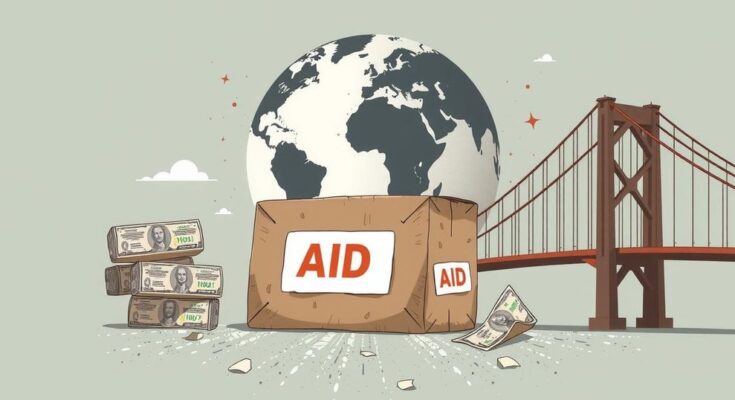Amid a freeze on U.S. foreign aid, bipartisan lawmakers express alarm that China might capitalize on the void in international development. Cambodian demining operations, heavily supported by U.S. grants, face suspension, raising concerns about safety and funding. China has already contributed funding, prompting fears of diminished U.S. influence in the region as NGOs seek alternative sources of support.
Lawmakers from both political parties express concerns regarding a potential void in international development due to the U.S. foreign aid pause, with China poised to fill the gap. Non-governmental organizations dependent on U.S. funding await clarity on the status of their financial support, which is crucial for their missions abroad. This freeze has prompted the Cambodian demining authority to announce a temporary halt to operations supported by U.S. grants, significantly impacting efforts to clear landmines in the country.
As reported, U.S. grants account for approximately 30% of Cambodia’s demining operations, a vital process to mitigate the remnants of historical conflicts. The Cambodian Mine Action Centre estimates that the nation is burdened with a staggering 4 to 6 million landmines, resulting in substantial casualties over the years. The leadership within Cambodian demining organizations is now exploring alternative funding sources amidst the uncertainty caused by the American funding freeze.
Bill Morse, chairman of the Cambodian Self-Help Demining, remarked, “We’ll take money from anyone if they help us clear landmines. I’m not going to be picky about it.” This reflects the urgent need for financial assistance in ongoing demining efforts. It is significant to note that China has already provided $4.4 million to the Cambodian demining authority, raising alarms in U.S. congressional circles about the implications of such shifts in funding dynamics.
During a recent hearing, members of the House Foreign Affairs Committee deliberated on U.S. foreign assistance, expressing fears that lack of engagement would cede influence to China in strategic areas like the Pacific Islands. “If we’re not there, China will be there,” testified former Republican Representative Ted Yoho, illustrating the competitive narrative surrounding international aid distribution. This growing anxiety emphasized the need for a responsive U.S. foreign policy.
Former ambassadors have urged for a swift resumption of U.S. funding for demining programs, highlighting its importance for fostering goodwill and accessing key government officials. Such efforts are seen as vital for national security, mitigating risks that arise from explosive remnants of war. The humanitarian consequences of this aid withdrawal are dire, with anticipated casualties from unsuspected landmines looming as activities pause.
The pause in U.S. foreign aid, particularly impacting demining operations in Cambodia, has raised significant concerns among lawmakers and NGOs. Lawmakers fear that as the U.S. reevaluates its foreign assistance, China stands ready to increase its influence in the region by filling the funding void left behind. Urgent calls have been made to reconsider the pause on assistance, as the humanitarian implications of this decision could be devastating, leading to further casualties from landmines left unaddressed.
Original Source: abcnews.go.com




